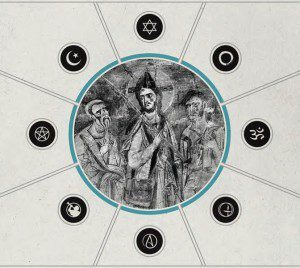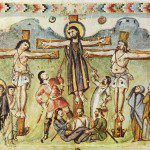
I remember a Wiccan leader saying in my world religions class that Christians find it hard to fathom that Pagans are back, although Christians tried to stamp them out in the States and Europe. While Christians have caused a lot of trauma for Pagans in trying to wipe them out in the past, which grieves me, Christians have also experienced a great deal of trauma over the centuries as a result of persecution. Such persecution is not a thing of the past, as many Christians suffer greatly for their faith presently in various nations around the world. We need therefore to give attention not only to Christians causing trauma to adherents of other religions in the past—and present, but also to the trauma we are experiencing at the hands of others in the present (Refer to this link for news of the rising persecution of Christianity worldwide; moreover, we must work with other religions to fight religious persecution of any and all faith traditions. See for example the Marrakesh Declaration).
I have written elsewhere at this column that what many Christians take to be persecution in the United States today may actually be a loss of privilege in a variety of cases. To the extent that the church is experiencing a loss of privilege in the U.S., how might we respond in becoming more resilient rather than operating out of a sense of trauma and victimization? Trauma and victimization often lead to reactionary impulses to regain a sense of security and perhaps even dominance. By contrast, resilience involves a sense of security in Christ and in one’s place in the world, even if and when part of a minority religious community. One does not have to take matters into one’s own hands, since Christ holds the whole world in his hands.
One way to become more resilient as Christians in our religiously plural world is to expand or change our historiography. Some Christians might call for making the U.S. a Christian nation again. But was America ever a Christian nation? (Refer to this article and interview with Mark Noll and George Marsden.) A lot of ink is spilled and energy expended on debating whether or not the founders of our country were Christian, and whether or not they sought to build the government and country on Christian principles. Personally, I believe it was a mixed bag, including Deists and Puritans and their values, among others. There were no doubt Christian influences, but not exclusively so, nor exclusively aiming at preserving the nation as Christian. Of course, some will debate whether or not the U.S. can retain its democratic values if the country’s Christian voice loses ground given their claim that Christian influences helped shaped the Constitution and related founding documents. For example, what happens if we were to elect a Muslim for President and if the majority of Americans were to become Muslim? In response, it would be worth considering that Christendom (signifying here those eras or locales where Christianity is deemed the official religion of empires or nations) has a long history going back to the Holy Roman Empire and “Christian” nation-states; many were hardly democratic, but persecuted religious minority communities, including Christians. The exchanges involving religion and geo-politics varies from time to time. Many religions have blood on their hands, Christian, Muslim, and others, based on various cultural and political forces present throughout the ages.
We need to go even further back than Christendom (when Christianity became the official religion of the Roman Empire). Christianity exploded on the scene in the first century in a pluralistic culture that was quite hostile to the faith. Such antagonism in the Roman Empire did not thwart the church’s growth; in fact, it may very well have served as a catalyst for it. We can learn a great deal from the early Christians on how to engage today. Even if we were to lose our Christian freedoms, the good news of Jesus Christ is not chained. The Apostle Paul’s confidence was in the power of God, not the church’s strength or freedom: “Remember Jesus Christ, risen from the dead, the offspring of David, as preached in my gospel, for which I am suffering, bound with chains as a criminal. But the word of God is not bound!” (2 Timothy 2:8-9) If Paul could operate with confidence and resilience while imprisoned in Rome for the sake of Jesus in a pre-Christendom world, certainly we can operate with such confidence and resilience in our post-Christendom society today.
In light of Paul and Christians throughout history living with resilience in the face of persecution as well as a loss of privileges, I have no need to try and compensate and try and take back the world for Jesus. As risen from the dead, Jesus is Victor. His Word is powerful and free (2 Timothy 2:8-9).













